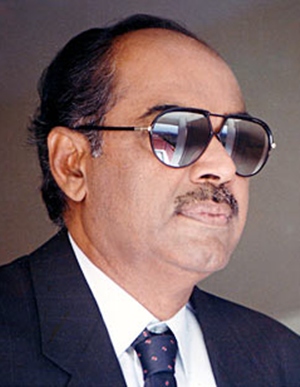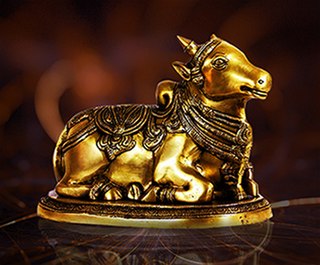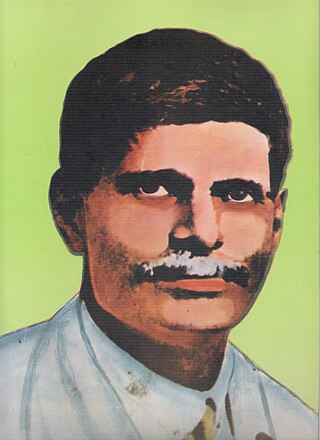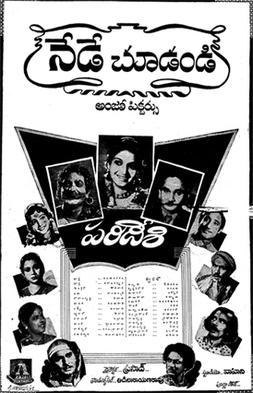Related Research Articles
Naidu is a Telugu title commonly used by various Telugu castes. 'Nayudu/Naidu' (నాయుడు) is a contraction of the Telugu word 'Nayakudu' (నాయకుడు) meaning leader, chief, or headman. Telugu castes such as the Kapu/Balija Kamma, Gavara, Golla, Turpu Kapu, Velama, Boya among others use this title. In Coastal Andhra, the term Naidu primarily refers to Kapu caste.

Daggubati Ramanaidu was an Indian film producer known for his work in Telugu cinema. He founded Suresh Productions in 1964 which became of one of the largest film production companies in India. He was one of the most influential movie Moguls in Indian cinema. He was placed in the Guinness Book of World Records for the most films produced by an individual, with more than 150 films in all official Indian languages. He also served as a Member of Parliament for the Bapatla constituency in Andhra Pradesh in the 13th Lok Sabha from 1999 to 2004.

Telugu cinema, also known as Tollywood, is the segment of Indian cinema dedicated to the production of motion pictures in the Telugu language, widely spoken in the states of Andhra Pradesh and Telangana. Based in Film Nagar, Hyderabad, Telugu cinema has grown to become the largest film industry in India in terms of box-office revenue as of 2021. Telugu films sold 23.3 crore tickets in 2022, the highest among all Indian film industries.

The Nandi Awards are the awards that recognise excellence in Telugu cinema, Telugu theatre, Telugu television, and Lifetime achievements in Indian cinema. Presented annually by the Government of Andhra Pradesh the awards are named after the big granite bull at Lepakshi - a cultural and historical symbol of the Telugu people.

Vanisri is an Indian actress known for her works predominantly in Telugu, Tamil, and Kannada films. In a film career spanning 40 years, she has received three Filmfare Awards South, the Nandi Awards and the Tamil Nadu State Film Award.
The Raghupathi Venkaiah Award is an award issued by the Indian state government of Andhra Pradesh, to recognise lifetime achievements in Telugu cinema. The award was introduced in 1981 in honour of Raghupathi Venkaiah Naidu, one of India's film pioneers regarded as the "father of Telugu cinema". The winner is presented a Golden Nandi, a gold medal, a citation and a cash prize of ₹50,000 (US$600) at the Nandi Awards functions.

Raghupathi Venkaiah Naidu, was an Indian filmmaker and entrepreneur, widely regarded as the father of Telugu cinema. A pioneer of Indian cinema, Naidu established the first Indian-owned movie theatres in South India and founded Star of the East Films, the first film production company established by a Telugu person. He is credited with producing Bhishma Pratigna (1921), considered the first Telugu feature film, thus laying the foundation for the Telugu film industry.
Hanumappa Muniappa Reddy, known as H. M. Reddy, was an Indian film director and producer, known for his works in Telugu cinema. He directed the first Indian multilingual sound film Kalidas (1931), shot in Telugu and Tamil. He then produced and directed the first full length Telugu sound film, Bhakta Prahlada in 1932.

Telugu Cinema Charitra, is a research book on Telugu Cinema History, by film critic, writer and Journalist B. Venkateshwarlu, published in 1997. The book is considered one of the first major studies of Telugu Film Industry between 1912 and 1995.
Anjali Pictures is an Indian film production house owned by famous music director P. Adinarayana Rao and versatile film actress Anjali Devi.
Raghupathy, Raghupati or Raghupathi is one of the Indian names.
Kovelamudi Surya Prakash Rao (1914–1996) was an Indian film director, producer, actor and cinematographer known for his works in Telugu, Tamil, Kannada, and Hindi films. In 1977 he won the Filmfare Award for Best Director – Kannada for Ganda Hendthi. In 1995, Rao received the Raghupathi Venkaiah Award for his contributions to Telugu cinema. He is the father of noted Telugu director K. Raghavendra Rao and is the uncle of another noted director K. Bapayya.

Dewan Bahadur Sir Raghupathi Venkataratnam Naidu was an Indian social reformer and educationist who hailed from present-day Andhra Pradesh. He was described as "the most powerful orator of his day". He worked for the eradication of untouchability and upliftment of Dalits. He strived for the reformation of the Devadasi system in Andhra, and succeeded to a considerable extent. He promoted widow remarriages and encouraged women's education.
Bugata Venkata Subba Rao, better known as B. A. Subba Rao, was an Indian film director and producer who predominantly worked in Telugu cinema. He is recipient of Raghupathi Venkaiah Award for his lifetime contribution to Telugu cinema.
Datla Venkata Suryanarayana Raju, commonly known as D. V. S. Raju, was a prominent Indian film producer in Telugu cinema. He played a pivotal role in the shifting of the Telugu film industry from Madras to Hyderabad. He was honoured with the Padma Shri in 2001 and the Raghupathi Venkaiah Award in 1988 for his lifetime contributions to Telugu cinema.
Keechaka Vadham is an Indian silent film produced, directed, filmed and edited by R. Nataraja Mudaliar. The first film to have been made in South India, it was shot in five weeks at Nataraja Mudaliar's production house, India Film Company. As the members of the cast were Tamils, Keechaka Vadham is considered to be the first Tamil film. No print of it is known to have survived, making it a lost film.

Cinema of South India, refers to the cinema of the four major film industries in South India; primarily engaged in making feature films in the four major languages of the region, namely — Telugu, Tamil, Kannada and Malayalam. They are often colloquially referred to as Tollywood, Kollywood, Sandalwood and Mollywood, respectively.
Dukkipati Madhusudhana Rao was an Indian film producer and screenwriter in Telugu cinema. As a producer, he received four National Film Awards and three Nandi Awards throughout his career. In recognition of his contributions to Telugu cinema, he was honoured with the Raghupathi Venkaiah Award by the Andhra Pradesh government in 1993.

Paradesi or Poongothai is a 1953 Indian Telugu-Tamil bilingual romance film, produced by P. Adinarayana Rao under the Anjali pictures banner and directed by L. V. Prasad. It stars Akkineni Nageswara Rao, Anjali Devi, Sivaji Ganesan and music also composed by P. Adinarayana Rao. The film is a remake of the Hindi movie Raj Rani (1950). No print of Poongothai is known to survive, making it a lost film.
Raghupathi Surya Prakash Rao Naidu (1901–1956), popularly known as R. S. Prakash, was an Indian film director, producer, and cinematographer. He was one of the pioneers of Indian cinema. He was the first director of Telugu cinema. He shot, developed and edited all his early films.
References
- ↑ "Bhishma (1936)". The Hindu. 1 February 2014. ISSN 0971-751X . Retrieved 12 March 2023.
The first silent version was produced and directed in 1921 by the now forgotten Indian film pioneer R. Prakash (then known as R. Suryaprakash or R.S. Prakash).
- ↑ Thoraval, Yves (2000). The Cinemas of India. Macmillan India. p. 346. ISBN 978-0-333-93410-4.
- ↑ Hindi Cinema Year Book. Screen World Publication. 2002. p. 21.
- ↑ Asian Film Directory and Who's who. 1952. p. 33.
- ↑ Hindustan Year-book and Who's who. M. C. Sarkar. 1989.
- ↑ Chabria, Suresh; Usai, Paolo Cherchi (1994). Light of Asia: Indian Silent Cinema, 1912-1934. Wiley Eastern. p. 15. ISBN 978-81-224-0680-1.
- ↑ Baskaran, Sundararaj Theodore (1981). The Message Bearers: The Nationalist Politics and the Entertainment Media in South India, 1880-1945. Cre-A.
- ↑ Rao, Akkina Mareswara (1997). "Celluloid and its past: Cultural and ideological mediation of Telugu cinema in colonial Andhra's Past" (PDF). University of Hyderabad . p. 93. Retrieved 19 August 2016.
- ↑ Thoraval, Yves (2000). The Cinemas of India. Macmillan India. ISBN 978-0-333-93410-4.
- ↑ Thoraval, Yves (2000). The Cinemas of India. Macmillan India. p. 16. ISBN 978-0-333-93410-4.
Raghupathi Surya Prakash (or Prakasa) was sent to study the cinema industries of London, Paris (Pathe), Germany, and Hollywood. He started the 'Star of the East Film Company' and went on to direct films in Telugu and Tamil.
- ↑ Jayasiṃha (2015). Indian Cinema Through the Century. Ministry of Information and Broadcasting, Government of India. p. 104. ISBN 978-81-230-1991-8.
Raghupathi Venkaiah had sent his son Raghupathi Surya Prakash Rao to learn about filmmaking in England. He was attached to Barker Studio in London. He made many silent movies on return from there.
- 1 2 3 Rajadhyaksha, Ashish; Willemen, Paul (1994). Encyclopaedia of Indian Cinema. British Film Institute. pp. 1994–1995. ISBN 978-0-85170-455-5.
- ↑ Garga, Bhagwan Das (1996). So Many Cinemas: The Motion Picture in India. Eminence Designs. p. 51. ISBN 978-81-900602-1-9.